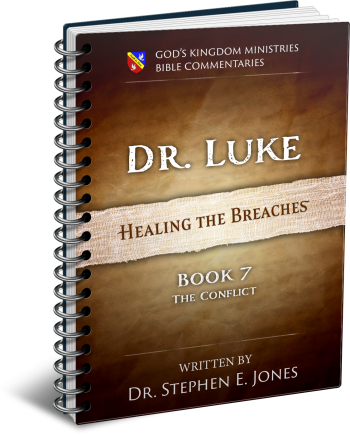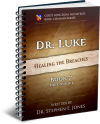Latest Posts
View the latest posts in an easy-to-read list format, with filtering options.

This is a commentary on Luke 18:31 to 21:38 Describing Jesus's trip to Jerusalem and the conflict with the Chief Priest leading to His Crucifixion.
Category - Bible Commentaries

In Luke 20:41-47 Jesus taught further on the subject of authority. In a way this loops back to the beginning of the chapter, when the chief priests confronted Jesus, asking the source of His authority. At that time He refused to tell them, because the chief priests would not tell Him where John the Baptist received his authority. At the end of the chapter, however, Jesus actually did answer their question without them realizing it.
Once the Sadducees had finished questioning Jesus, He then reversed the situation and asked them a question about Psalm 110:1. We read in Luke 20:41-44,
41 And He said to them, “How is it that they say the Christ is David’s son? 42 For David himself says in the book of Psalms, ‘The LORD said to my Lord, Sit at my right hand, 43 until I make thine enemies a footstool for thy feet’. 44 David therefore calls Him ‘Lord,’ and how is He his son?”
Since the Sadducees gave no answer—nor does Jesus Himself—we can only assume that the Sadducees did not know the answer.
The Melchizedek Order
John Lightfoot tells us that the Jews applied this verse to Abraham, probably because Psalm 110:4 says,
4 The Lord has sworn and will not change His mind, “Thou art a priest forever according to the order of Melchizedek.”
Lightfoot comments:
“The Jewish authors have it thus: Sem [i.e., Shem] the Great said unto Eliezer [Abraham’s servant], ‘When the kings of the east and of the west came against you, what did you?’ He answered and said, ‘The Holy Blessed God took Abraham, and made him to sit on his right hand’.” And again: “The Holy Blessed God had purposed to have derived the priesthood from Shem; according as it is said, ‘Thou art the priest of the most high God’ [Gen. xiv]…” [Lightfoot, Commentary on the New Testament from the Talmud and Hebraica, Vol. III, p. 197]
It was understood in those days that Shem was the Melchizedek of Gen. 14:18. He was the builder of Jerusalem and ruled his city as the King-Priest (“Melchizedek”). He was the holder of the birthright, and because he lived 600 years, he actually outlived Abraham himself.
It was believed, then, that David had Shem and Abraham in mind when he wrote Psalm 110. No doubt this was true, for David referenced the story of Abraham when he subdued the kings of Shinar after they had taken his nephew captive. In that sense, Abraham’s “enemies” were put under the feet of Abraham.
But this also applied to David himself, who was a Melchizedek priest in his generation. The mantle of that priestly Order had been passed down to David and would ultimately rest upon the Messiah in an unchanging priesthood (Heb. 6:20).
Hebrews 5-7 discusses how both David and Jesus were the high priests of the Melchizedek Order. Since both were of Judah, neither were eligible to be priests of Levi, for Heb. 7:12-14 says,
12 For when the priesthood is changed, of necessity there takes place a change of law also. 13 For the one concerning whom these things are spoken belongs to another tribe, from which no one has officiated at the altar. 14 For it is evident that our Lord was descended from Judah, a tribe with reference to which Moses spoke nothing concerning priests.
Jesus’ claim to the high priesthood of Melchizedek, therefore, was not based upon His genealogy, for then He would have had to claim descent from Aaron, who was of Levi. Jesus was descended from David and of the tribe of Judah through His mother, and this descent qualified Him as the King, but not as the High Priest. His claim to the high priesthood came through His Father, for He was begotten of God. Heb. 5:5, 6 says,
5 So also Christ did not glorify Himself so as to become a high priest, but He who said to Him, “Thou art My Son, today I have begotten Thee”; 6 just as He says also in another passage, “Thou art a priest forever according to the order of Melchizedek.”
It is evident, then, that Christ’s claim to priesthood came on account of His descent from His heavenly Father, not from His mother.
So is it with all of us who are in Christ. To be of the Melchizedek Order and qualify for both kingship and priesthood, one must have a heavenly Father and an earthly mother. This Order combines heaven and earth, and its priests have authority in both realms, as did Jesus Himself (Matt. 28:18).
Both David and Jesus were messiahs in the sense of being “anointed” by God. But David was only a type, whereas Jesus was the antitype. Jesus was also the Logos, the Memrah, the living word, as we explained in chapter 11. Hence, it is significant that Psalm 110 was the fourth psalm of the Deuteronomy Book of Psalms, whose theme is The Word. The psalms are divided into five books, each correlating with the Torah. Psalm 107-150 is the fifth book of Psalms.
Psalm 110 reveals how Christ is the manifestation of The Living Word and how we all may enter into His experience by being begotten from above. This is the key to understanding Jesus’ question in Luke 20. Normally, a son would call his father “lord,” recognizing his authority under the Fifth Commandment, “Honor your father and your mother” (Deut. 5:16). But when we are begotten from above, our Father is in heaven, and all earthlings must bow to the sons of God.
Hence, even David himself called the Messiah “Lord.” By extension, all the kings of the earth are subject to the sons of God, for the authority of earthly kings—however great—is derived from flesh and bloodline. Even the bloodline of Israel’s kings was derived from Adam, for the dominion mandate was passed down from Adam.
There is a greater authority in the earth, not recognized by many, and it is called the Melchizedek Order. Shem was the first, it seems, to have used that title. Not every king of Israel was a Melchizedek priest, but only true believers who had been begotten by their heavenly Father through faith in Christ (in whatever capacity they had understanding). Most of the kings of Israel and Judah, however, were unbelievers, and to that list may be added most of the other kings of the earth.
It is evident, then, that the force of Jesus’ question in Luke 20 was to lay foundations for apostolic teaching on Sonship. This baffling question about David calling his son “Lord” opened up the revelation about how even the fleshly authority of kings, including David himself, must bow to the spiritual authority of the Melchizedek Order.
So Paul says in 1 Cor. 4:15, “for in Christ I begot you through the glad tidings” (The Emphatic Diaglott). In other words, Paul preached the gospel to them, so that they might be begotten by faith in Christ. Peter echoes this in 1 Peter 1:23-25 (NASB), saying,
23 for you have been born again [begotten] not of seed which is perishable but imperishable, that is, through the living and abiding word of God.
Those who claim authority on the basis of their earthly fathers (ultimately back to Adam) are claiming to have been begotten by “perishable” (mortal) seed, as Peter says next,
24 For “All flesh is like grass, and all its glory like the flower of grass. The grass withers, and the flower falls off. 25 But the word of the Lord abides forever.” And this is the word which was preached to you.
The sons of God, then, are not those who are begotten by mortal and corruptible seed, which was derived from Adam, but are those who were begotten by the incorruptible seed of the gospel that was preached to us and which we received by faith. Even as Mary herself testified, saying, “be it done to me according to your word” (Luke 1:38), so also do we receive the heavenly Seed in obedience and submission to the will of God.
That holy seed that indwells us even now is “Christ in you, the hope of glory” (Col. 1:27). If we identify with that New Creation Man, forsaking the identity of the old Adam, then we are of the Melchizedek Order of King-Priests and the true sons of God. These also become the living word as part of the body of Christ, the Memrah.
Psalm 110:1 literally reads, “Yahweh said to my Adonai, “Sit at My right hand…”
There were 134 passages where the ancient scribes altered the vowel points to make Yahweh read Adonai. These are all listed in Appendix 32 of The Companion Bible. Psalm 110:1 is NOT one of those passages that were altered. Hence, David literally wrote Yahweh and Adonai in this verse. There are many other places in Scripture where Adonai refers to Christ. In fact, Ezekiel often combines the two, saying “Adonai Yahweh,” usually translated “the Lord God.”
So we see that in 134 cases the scribes inserted vowel points to alter the reading of Yahweh, but in all other cases, the prophets themselves wrote Adonai. I say this because some have criticized the use of the term Adonai and even the English word “Lord,” as if it is demeaning to Yahweh. They based this largely on the fact that the Phoenicians called their god Adonai, derived from the Greek god Adonis.
But just because the Phoenicians and Greeks used those terms did not mean that the Hebrews had to stop using the term, especially where it appears in the actual text of Scripture. Further, just because Adonai means “lord” (actually a landlord, or owner) does not mean that we must avoid using the term “lord” in reference to Yahweh or Jesus. In fact, it is wrong to call any other god by this term, for we recognize just one Lord over creation. His right to be called Adonai is based on the laws by which the Creator owns what He has created.
Luke used the Greek term Kyrios, translated as “Lord.” It means “place of honor,” and it recognizes Christ’s place of honor at the right hand of His Father. Luke 20:42 says, “The LORD said [lego] to my Lord…” Interestingly enough, the Greek word lego is comes from the Greek word Logos. It is as if the prophecy is telling us, “Yahweh logos-ized Christ,” exercising His divine right to choose who to seat at His right hand.